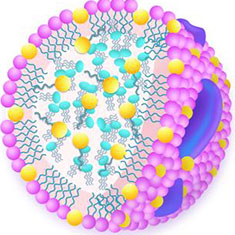Universitetsavisen
Nørregade 10
1165 København K
Tlf: 21 17 95 65 (man-fre kl. 9-15)
E-mail: uni-avis@adm.ku.dk
Ph.d.-forsvar
Ph.d.-forsvar — Trine Levring Wilkens is defending her PhD thesis: "Alcohol consumption and lipoproteins, lipoprotein subfractions, and apolipoproteins - exploring the relationship with cardiovascular disease
Date & Time:
Place:
Festauditoriet, Bülowsvej 17, 1870 Frederiksberg
Hosted by:
Department of Nutrition, Exercise and Sports, University of Copenhagen
Cost:
Free
About the thesis
The relationship between alcohol consumption and cardiovascular disease has been described by a J-shaped curve. Moderate alcohol consumption, i.e. no more than 1 drink per day for women and 2 for men, is associated with reduced risk of coronary heart disease, ischemic stroke, and all-cause mortality in middle-aged men and women.
Intervention studies on changes in cardiovascular biomarkers support a potential advantage of moderate alcohol intake, including improved lipoprotein and apolipoprotein levels. Lipoproteins are heterogeneous particles with complex metabolic functions, dependent on their physical property, size, and composition.
Firstly, this PhD thesis investigated the relationship between alcohol intakes up to 60 g/d and all types of lipoprotein subfractions and related mechanisms in a systematic review.
Secondly, associations between alcohol consumption and high-density lipoprotein (HDL) subspecies defined by the absence or presence of selected apolipoproteins were explored in a cross-sectional analysis of older adults. Associations to whole plasma apolipoproteins were also investigated.
Thirdly, the effects on lipoprotein main- and subfractions and on apolipoproteins were investigated in healthy men and women after three weeks of moderate alcohol intake compared with abstention in a single-blinded cross-over intervention trial.
The systematic review included 114 studies and found increased levels of all types of HDL subfractions, including fractions defined by cholesterol content, apolipoprotein composition, or particle number. Indications of reduced apoB and smaller low-density lipoproteins (LDL) were observed, although inconsistent. The cholesterol efflux capacity and paraoxonase activity were consistently increased.
In the cross-sectional analysis, positive associations to HDL subspecies lacking apoC3, apoE, or apoJ, as well as HDL subspecies containing apoC3, apoE, or apoJ were found. Whole plasma levels of apoA1 and apoC3 were also directly associated with alcohol intake, but the positive association to total apoC3 was driven by few heavily drinking men.
In the cross-over trial, total apoA1 and the content of apoA1, cholesterol, and phospholipids in almost all HDL subfractions were increased in the drinking periods compared with abstention. A reduced apoB/apoA1 ratio was also found, in addition to a lower LDL particle number in women alone.
In conclusion, moderate alcohol intake may change the lipoproteins towards a less atherogenic profile, although this needs confirmation in future randomised controlled trials.
Opponents
Professor Inge Tetens (chair), Department of Nutrition, Exercise and Sports, University of Copenhagen, Denmark.
Professor Kirsten Bjørklund Holven, Department of Nutrition, Institute for Basic Medical Sciences, Faculty of Medicine, University of Oslo, Norway.
Professor Morten Grønbæk, Director of National Institute of Public Health, Head of Research in Center for Intervention Research, University of Southern Denmark, Denmark.
Main supervisor
Professor Lars Ove Dragsted, Department of Nutrition, Exercise and Sports, Section for Preventive and Clinical Nutrition, Faculty of Science, University of Copenhagen, Denmark.
Co-supervisor
Co-supervisor: Jane Nygaard Eriksen, (September 2017-March 2021), Department of Nutrition, Exercise and Sports, Faculty of Science, University of Copenhagen, Denmark.
